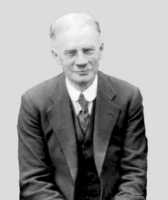James McBroom
1868 — 19-3-1951
Author Index
I have been unable to find anyone who is able to
give a character sketch of J McBroom.
Here is the scanty and unverified
information that I have been able to collect concerning him.
My mother: Christine M. N. Hodgett (née Moyes) at the age of seventeen was saved under his preaching.
This was during the second world war and James McBroom would have been in his seventies.
My father was offered his library by his widow, but did not feel it right to accept it. [L.H.]
 He came to
a saving knowledge of the Lord Jesus Christ as a young man. He was a miner
and was illiterate. It is said that, when he was saved, with the first
week´s wages he bought a Bible, with his second wage he bought a
concordance and with these he proceeded to teach himself to read and
write.
He came to
a saving knowledge of the Lord Jesus Christ as a young man. He was a miner
and was illiterate. It is said that, when he was saved, with the first
week´s wages he bought a Bible, with his second wage he bought a
concordance and with these he proceeded to teach himself to read and
write.
His writings reveal the progress he made, that he had a very capable
mind and the good use to which he put his self-education — to glorify the
one who saved him. His vocabulary and the standard of his written English
are not that of an uneducated man. Some may have to look up the meaning of
the words he used — e.g. ´adumbrate´: (to represent in
outline, foreshadow, typify - Concise Oxford Dictionary). He also learned
sufficient Greek to assist him in his Bible study and teaching. He was
known to quote secular writers such as Rabbie Burns and Shakespeare and
compare them unfavourably with the Song of Solomon and the beauty of
Scripture.
He was a dynamic personality and not one to hide his feelings. It is
recounted that when singing (loudly) ´Oh the brightness of the glory
shining in the Saviour's face´ he would beat time to it with his
feet. The same enjoyment of the glory of his Lord is apparent in his
writings, they are not voluminous but they are very largely bringing forth
the glories of the Lord Jesus Christ.
He lost his first wife and all his six children to either tuberculosis
or diphtheria. He remarried and his second wife Kathleen survived him. Mr. McBroom
lived in the Kilmarnock area for most of his life, then latterly in
Brighouse and then Port Seton near Edinburgh. He had depressive mental
illness later in life and had to be in hospital for some time, perhaps
related to his tragic family life.
Author Index
 He came to
a saving knowledge of the Lord Jesus Christ as a young man. He was a miner
and was illiterate. It is said that, when he was saved, with the first
week´s wages he bought a Bible, with his second wage he bought a
concordance and with these he proceeded to teach himself to read and
write.
He came to
a saving knowledge of the Lord Jesus Christ as a young man. He was a miner
and was illiterate. It is said that, when he was saved, with the first
week´s wages he bought a Bible, with his second wage he bought a
concordance and with these he proceeded to teach himself to read and
write.